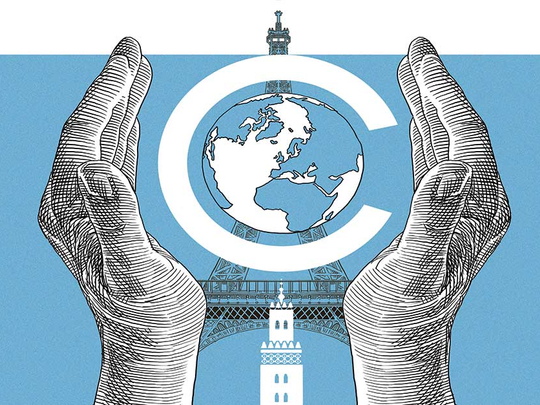
The 2016 annual United Nations climate change conference began in Africa on Monday. The mood of the important event in Marrakech has been generally high, given that the landmark Paris global climate treaty, agreed upon last December in a diplomatic breakthrough, came into effect on November 4.
To be sure, there are still those who argue that the agreement does not go far enough. For instance, a group of senior climatologists warned in September that the planet could as soon as 2050 see global average temperature rise to 2 degrees Celsius above pre-industrial levels, the level many scientists say we must not breach if we are to avoid the worst risks of global warming.
This underlines that while the Paris Agreement — reached by more than 190 countries as the successor treaty to the 1997 Kyoto Protocol — is a very welcome shot in the arm for attempts to tackle global warming, even more ambition is very likely to be needed in the future. While some, therefore, assert that the deal is fatally flawed, it should be remembered that the years of negotiations that led to Paris were enormously difficult and nearly broke down on multiple occasions. Whereas Kyoto involved a deal for the European Union states and 37 developed countries, Paris involved developing countries too and a much wider range of complex issues.
What is also remarkable about the agreement is the pace (less than 12 months) with which it has come into force, compared to many other international treaties, which required at least 55 countries accounting for a minimum of 55 per cent of global emissions ratifying it, despite these troubled circumstances. This fast pace partially reflects international concerns that a climate denier could win the Republican nomination for United States president in 2016, as indeed eventually happened with Donald Trump, who believes climate change is a “hoax”. This argument is reckless, given the strong scientific consensus on global warming and its potentially calamitous perils.
The concerns about a climate denier winning the Republican nomination were particularly acute given that it was, politically, impossible to get the Paris Treaty approved in the US Congress. US President Barack Obama, therefore, embedded the agreement through executive actions, which could be unravelled by a future president, and indeed are also being challenged in US courts.
However, while Obama’s executive orders can be reversed, the Paris deal contains a clause that could ‘lock-in’ US support for the foreseeable future. This is because the agreement, which is in force now, contains a provision that any nation wishing to withdraw must wait four years — the length of a US presidential term.
In this context, rather than viewing the Paris Agreement as the end of the process, it must be seen as the complex beginning of a longer journey that governments and legislators must now make in 2017 and beyond. The roadmap for moving forward is already clear from Marrakech onwards.
Not legally binding
Firstly, implementation of the deal will be most effective through national laws where politically feasible. The country ‘commitments’ put forward in Paris will be more credible — and durable beyond the next set of national elections — if they are backed up by national legislation where this is possible, not least because the targets in the deal are not legally binding,
And this must ideally be supported by well-informed, cross-party lawmakers from across the political spectrum, who can put in place a credible set of policies and measures to ensure effective implementation, and hold governments to account so Paris delivers. To enable this to happen, bodies like the Council of Europe advocate dissemination of best practice across legislatures from Asia-Pacific to the Americas, the building of capacity and promotion of common, effective approaches across countries.
To be sure, it is disheartening that the Paris Agreement is not yet enough to avoid the global average temperature rise to 2 degrees Celsius above pre-industrial levels being breached. However, the domestic legal frameworks that are being put in place are nonetheless crucial building blocks to measure, report, verify and manage greenhouse gas emissions.
Specifically, countries are required under the Paris deal to openly and clearly report on emissions and their progress in reaching the goals in their national climate plans submitted to the United Nations. States must also update these every five years, highlighting the measures being pursued to implement the goals.
Post-Marrakech, the ambition must be that these frameworks are replicated in even more countries and progressively ratcheted up. There are clear signs of this happening already in numerous states, from Asia-Pacific to the Americas, as countries seek to toughen their response to global warming.
What this movement towards a more robust stance on climate change shows is the scale of the transformation in attitudes taking place among many governments and wider societies across the globe. As will be shown yet again in Marrakech, many countries now view tackling global warming as in the national self-interest and see, for instance, that expanding domestic sources of renewable energy not only reduce emissions, but also increases energy security by reducing reliance on imported fossil fuels.
Reducing energy demand through greater efficiency reduces costs and increases competitiveness. Improving resilience to the impacts of global warming also makes economic sense. And domestic laws also give clear signals about direction of policy, reducing uncertainty, particularly for the private sector.
Going forward, all of this underlines why legislators must be at the centre of international negotiations and policy processes, not just on climate change, but also on the full range of UN sustainability issues, including the 2030 development goals. Along with governments, lawmakers can now help co-create, and follow-through to implement, what could be a foundation of global sustainable development in coming decades for billions across the world, starting with implementation of the Paris climate deal from 2017.
Andrew Hammond is an Associate at LSE IDEAS (the Centre for International Affairs, Diplomacy and Strategy) at the London School of Economics.











